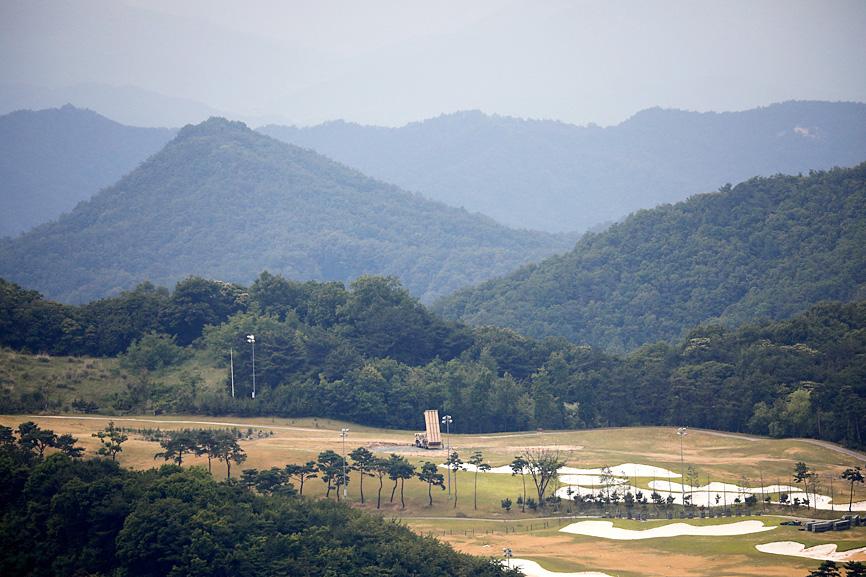China and South Korea yesterday clashed over a US missile defense shield, threatening to undermine efforts by the new government in Seoul to overcome long-standing security differences.
The disagreement over the Terminal High Altitude Area Defense (THAAD) system installed in South Korea emerged after an apparently smooth first visit to China by South Korea’s foreign minister this week.
China, contending that the THAAD’s powerful radar could peer into its airspace, curbed trade and cultural imports after Seoul announced its deployment in 2016, dealing a major blow to relations.

Photo: Reuters
A senior official in South Korea’s presidential office yesterday told reporters that the THAAD is a means of self-defense and can never be subject to negotiations, after China demanded that Seoul not deploy any more batteries and limit the use of existing ones.
South Korean President Yoon Suk-yeol, seeing the system as key to countering North Korean missiles, has vowed to abandon the previous government’s promises not to increase THAAD deployments, and not to participate in a US-led global missile shield or create a trilateral military alliance involving Japan.
On the campaign trail, the conservative Yoon pledged to buy another THAAD battery, but since taking office in May, his government has focused on what officials call “normalizing” the operation of the existing, US-owned and operated system.
South Korean Minister of Foreign Affairs Park Jin and his Chinese counterpart, Wang Yi (王毅) at a meeting on Tuesday explored ways to reopen denuclearization talks with Pyongyang and resume cultural exports, such as K-pop music and movies, to China.
A Wang spokesman said on Wednesday the two had “agreed to take each other’s legitimate concerns seriously and continue to prudently handle and properly manage this issue to make sure it does not become a stumbling block to the sound and steady growth of bilateral relations.”
The Chinese spokesman told a briefing the THAAD deployment in South Korea “undermines China’s strategic security interest.”
However, Park told Wang that Seoul would not abide by the 2017 agreement — called the “three noes” — as it is not a formal pledge or agreement, the South Korean foreign ministry said in a statement.
China also said Seoul should abide by “one restriction” — limiting the use of existing THAAD batteries.
South Korea has never acknowledged that element, but on Wednesday, Wang’s spokesman said that China attaches importance to the position of “three noes and one restriction.”
South Korean Minister of National Defense Lee Jong-sup said the policy on the THAAD would not change because of China’s opposition, and the system’s radar could not be used against China.
“The current battery is not structured to play any role in US defenses, but placed in a location where it can only defend the Korean Peninsula,” he told reporters.

ACTION PLAN: Taiwan would expand procurement from the US and encourage more companies to invest in the US to deepen bilateral cooperation, Lai said The government would not impose reciprocal tariffs in retaliation against US levies, President William Lai (賴清德) said yesterday, as he announced five strategies to address the issue, including pledging to increase Taiwanese companies’ investments in the US. Lai has in the past few days met with administrative and national security officials, as well as representatives from various industries, to explore countermeasures after US President Donald Trump on Wednesday last week announced a 32 percent duty on Taiwanese imports. In a video released yesterday evening, Lai said that Taiwan would not retaliate against the US with higher tariffs and Taiwanese companies’ commitments to

Intelligence agents have recorded 510,000 instances of “controversial information” being spread online by the Chinese Communist Party (CCP) so far this year, the National Security Bureau (NSB) said in a report yesterday, as it warned of artificial intelligence (AI) being employed to generate destabilizing misinformation. The bureau submitted a written report to the Legislative Yuan in preparation for National Security Bureau Director-General Tsai Ming-yen’s (蔡明彥) appearance before the Foreign Affairs and National Defense Committee today. The CCP has been using cognitive warfare to divide Taiwanese society by commenting on controversial issues such as Taiwan Semiconductor Manufacturing Co’s (TSMC, 台積電) investments in the

‘SPECIAL CHANNEL’: Taipei’s most important tasks are to stabilize industries affected by Trump’s trade tariffs and keep negotiations with Washington open, a source said National Security Council Secretary-General Joseph Wu (吳釗燮) arrived in the US for talks with US President Donald Trump’s administration, a source familiar with the matter said on Friday. Wu was leading a delegation for a meeting known as the “special channel,” the Financial Times reported earlier. It marked Trump’s first use of the channel since returning to the White House on Jan. 20. Citing a source familiar with the matter, the Financial Times reported that Minister of Foreign Affairs Lin Chia-lung (林佳龍) was also a part of the delegation. The visit came days after China concluded war games around Taiwan and amid Trump’s

HELPING HAND: The steering committee of the National Stabilization Fund is expected to hold a meeting to discuss how and when to utilize the fund to help buffer the sell-off The TAIEX plunged 2,065.87 points, or 9.7 percent, to close at 19,232.35 yesterday, the highest single-day percentage loss on record, as investors braced for US President Donald Trump’s tariffs after an extended holiday weekend. Amid the pessimistic atmosphere, 945 listed companies led by large-cap stocks — including Taiwan Semiconductor Manufacturing Co (TSMC, 台積電), Hon Hai Precision Industry Co (鴻海精密) and Largan Precision Co (大立光) — fell by the daily maximum of 10 percent at the close, Taiwan Stock Exchange data showed. The number of listed companies ending limit-down set a new record, the exchange said. The TAIEX plunged by daily maxiumu in just